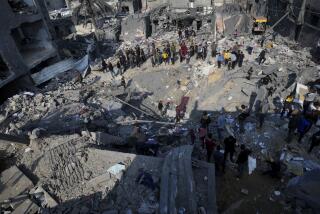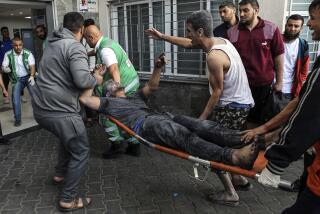Foray Is Shift, but No D-Day
- Share via
WASHINGTON — In earlier, more conventional conflicts, the first landing of American ground troops in a new theater as often as not marked a turning point in the campaign: Think of D-day, or Inchon in Korea, or the wide left hook of Desert Storm.
But in the unconventional war underway in Afghanistan, today’s engagement of the Army Rangers and special operations forces may not have been that kind of turning point. The Army is unlikely to follow this insertion with waves of infantry and armor designed to seize Afghan territory and hold it.
Instead, the battle probably marked a different crossroads: the first significant ground combat in what President Bush and Defense Secretary Donald H. Rumsfeld have been calling “a new kind of war.”
This was an unfamiliar type of invasion to Americans who grew up in the shadow of World War II, Korea, Vietnam or the Persian Gulf War.
The troops landed not to occupy territory but to test the defenses of Afghanistan’s ruling Taliban, to gather intelligence--and, perhaps, to send a message.
The first wave of this invasion was not one of the familiar shock-force units of earlier wars--neither a Marine expeditionary force nor the Army’s 82nd Airborne Division. It was a special operations group, its identity an official secret.
The U.S. troops were already out of Afghanistan, their work done, before most Americans learned they had landed.
The battle broke a significant political barrier too: the taboo in recent years against the use of U.S. ground troops. In the 1991 Gulf War, President George H. W. Bush spent months arguing with Congress over the authority to use ground forces against Iraq, and he won the legislators’ approval only narrowly. In the 1999 war in Yugoslavia, President Clinton managed to fight solely from the air and avoid the use of ground forces altogether.
In both of those conflicts, one of the White House’s chief concerns was the risk of casualties. Americans, it was believed, would not stand for the sight of body bags coming home from overseas. And that meant military planners had to look for ways to win their battles without putting individual soldiers in harm’s way on the ground.
But this time, there was no such taboo--perhaps because, on Sept. 11, the United States already suffered more dead than in most of the battles of its history.
Indeed, in another break with tradition, the President did not immediately go on television Friday to tell the nation that its troops were now in ground combat. Instead, he was in China, attending a Pacific Rim economic summit.
Officials said the president knew before he departed on his trip that ground combat was possible but that he chose to go anyway--apparently feeling that the domestic groundwork for this new, more intensive phase of the war had already been laid.
Remarkably, in a war that has been notable for officials’ preoccupation with secrecy, the concept of sudden ground insertions of special operations troops--if not, to be sure, the time and place--had been loudly and repeatedly foreshadowed.
On Thursday, at a Pentagon press briefing, Rumsfeld offered a broad hint of what was to come. In answer to a question about how much of this war has been invisible, as opposed to the very visible aerial component, Rumsfeld said, in effect, that ground operations might well be the most important part of the campaign.
Aircraft “can do certain things within reasonable degrees of accuracy--and we also know they can’t do other things,” Rumsfeld said. “They can’t crawl around on the ground and find people.”
In fact, Pentagon officials have been almost forthright in predicting that if the ultimate target of the U.S. expedition in Afghanistan--alleged terrorist chieftain Osama bin Laden--is to be found, it will probably be by U.S. special operations troops on the ground, perhaps working with Afghan allies.
Officials refused to discuss the purpose of today’s operation.
It might have been to test Taliban defenses or those of Bin Laden’s terrorist network, Al Qaeda--to “produce intelligence” by prompting panicked action by an adversary.
It might have been to lure a dug-in opposition force into the open, where it could be more easily hit.
Or it might have been aimed at what officials call a “target of opportunity”--a chance to strike at Bin Laden or his forces that appeared unexpectedly.
And it might not have been the first U.S. ground engagement in Afghanistan after all.
In his briefing Thursday, Rumsfeld almost ostentatiously ducked the question of whether U.S. forces had already seen action on the ground. “We have decided that until we have an activity that is significant and noticeable, that it’s probably not useful to get into those kinds of questions, because they can change from time to time,” he said.
Today, that line was crossed: The engagement was significant and noticeable.
More to Read
Sign up for Essential California
The most important California stories and recommendations in your inbox every morning.
You may occasionally receive promotional content from the Los Angeles Times.












